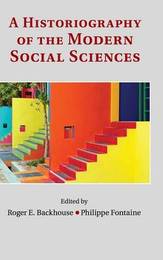
|
A Historiography of the Modern Social Sciences
Hardback
Main Details
| Title |
A Historiography of the Modern Social Sciences
|
| Authors and Contributors |
Edited by Roger E. Backhouse
|
|
Edited by Philippe Fontaine
|
| Physical Properties |
| Format:Hardback | | Pages:260 | | Dimensions(mm): Height 229,Width 152 |
|
| Category/Genre | Economic theory and philosophy |
|---|
| ISBN/Barcode |
9781107037724
|
| Classifications | Dewey:300.72 |
|---|
| Audience | | Professional & Vocational | |
|---|
| Illustrations |
1 Tables, unspecified; 1 Line drawings, black and white
|
|
Publishing Details |
| Publisher |
Cambridge University Press
|
| Imprint |
Cambridge University Press
|
| Publication Date |
22 September 2014 |
| Publication Country |
United Kingdom
|
Description
A Historiography of the Modern Social Sciences includes essays on the ways in which the histories of psychology, anthropology, sociology, economics, history and political science have been written since the Second World War. Bringing together chapters written by the leading historians of each discipline, the book establishes significant parallels and contrasts and makes the case for a comparative interdisciplinary historiography. This comparative approach helps explain historiographical developments on the basis of factors specific to individual disciplines and the social, political, and intellectual developments that go beyond individual disciplines. All historians, including historians of the different social sciences, encounter literatures with which they are not familiar. This book will provide a broader understanding of the different ways in which the history of the social sciences, and by extension intellectual history, is written.
Author Biography
Roger E. Backhouse is Professor of the History and Philosophy of Economics at the University of Birmingham, where he has taught since 1980. He has held a part-time position in the Erasmus Institute of Philosophy and Economics, and in 2007 he was Ludwig Lachmann Research Fellow in the Department of Philosophy at the London School of Economics. He has also taught at University College London, Keele University, the University of Bristol, the University of Buckingham, and the University of Oporto. He currently holds a Leverhulme Trust Major Research Fellowship to write an intellectual biography of Paul Samuelson. He is the coeditor of The History of the Social Sciences since 1945 (Cambridge, 2010); The Unsocial Social Science?: Economics and Neighboring Disciplines since 1945 (2010); and The Cambridge Companion to Keynes (Cambridge, 2006). He is author of The Ordinary Business of Life (2002) and The Penguin History of Economics (2002). He has written for a number of journals, including Economica, the Journal of Economic Perspectives, History of Political Economy, the Journal of the History of Economic Thought, and the Journal of Economic Methodology. He has been review editor for the Economic Journal, editor of the Journal of Economic Methodology, and associate editor of the Journal of the History of Economic Thought. Philippe Fontaine is Professor of Economics in the Department of Economics at Ecole Normale Superieure de Cachan. In 2003-4, he was Ludwig Lachmann Research Fellow in the Department of Philosophy at the London School of Economics and Political Science. He is the coeditor of The History of the Social Sciences since 1945 (Cambridge, 2010); The Unsocial Social Science?: Economics and Neighboring Disciplines since 1945 (2010); and The Experiment in the History of Economics (2005). He has written for a number of journals, including the British Journal of Sociology, Economics and Philosophy, History of Political Economy, Isis, the Journal of the History of Economic Thought, and Science in Context. He has been the associate editor of Revue de philosophie economique. In 2005, he received the Best Article Award from the Forum for History of Human Science. In 2008, he was the recipient of the prix d'excellence en sciences sociales from Foundation Mattei Dogan/CNRS.
Reviews'... this volume could be better considered to be a reference work for the historiographies of the modern social disciplines, and, if so, one I do recommend.' Marcel Boumans, Journal of the History of Economic Thought
|